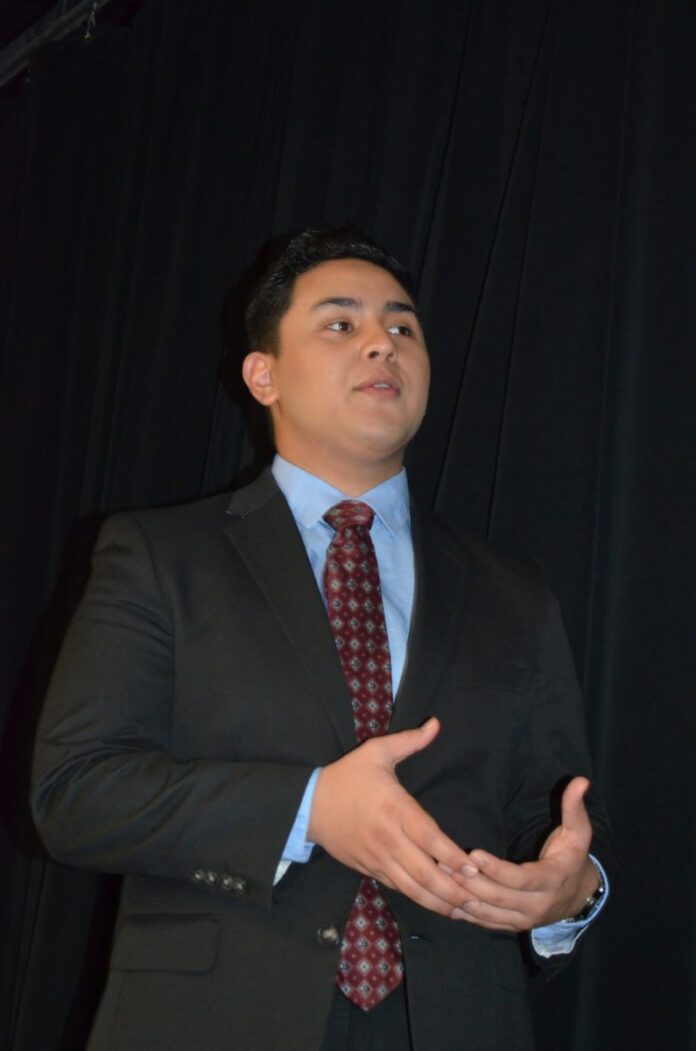HARLINGEN — We live in a world of speed.
Brandon Salas, a junior at Harlingen High School, knows that all too well, having moved here two years ago from Guam, a tiny U.S. island territory in the western Pacific.
“The first thing I noticed was how small Guam is compared to the States,” said Brandon, 16. He and his mother moved here for better job opportunities. Guam, he said, was extremely expensive. His aunt and uncle, who live here, told them about the opportunities and they decided to relocate.
The move was rather sudden, but joining the school’s Speech, Drama and Debate Team has helped him adjust to his new home. He and three other members of the team recently placed in the Harvard Invitational Tournament. He made it to the octofinals in the original oratory event, meaning he finished in the top 60 of more than 266 contestants.
During Brandon’s oratory, which he delivered with great energy and enthusiasm, he spoke about people’s tendency to work “faster, faster and faster.”
He’d had the chance to observe the difference between speed and slowness.
“In Guam, if you’re going to get from Point A to Point B, you often look off into the ocean and you’ll see the beach, and here that doesn’t happen,” he said. “In Guam, we don’t have highways or freeways. We only have roads. The fastest that you can go is 35 miles per hour.”
He said a faster-paced world is more productive, but at the same time he felt it was ineffective in certain aspects.
Here, he explained, classes in public schools finish at about 4 p.m. In Guam, however, the school day ends at 1:30 p.m., giving young people the chance to participate in more projects.
“I was able to get off from school, finish my chores, finish my homework, and if there was a cleanup at the beach, I and my friends would go,” he said. “Here, you get out of school, you come home, you do homework. That’s my whole day. I just think that goes to waste.”
Brandon’s had cause to reflect on the educational opportunities, which he feels give him a greater advantage but also negatively impacts learning. For example, extensive testing such as the State of Texas Assessment of Academic Readiness inhibits the educational process in some key areas, he says.
“In Guam, we don’t have those tests,” he said. “Here it’s about preparing for final exams. Over there it’s making sure that what you’re being taught, you’re being taught in the best way. So Guam and Texas have different ways of measuring that.”
Of course the next reference is the problem of “teaching to the test.”
“Here I have to make sure I’m prepared for the test Friday,” he said. “To me that just makes learning unenjoyable. In Guam you are given projects to do and that’s what makes the classroom so involved in learning the material. It becomes fun to learn in the classroom. Here it’s all about studying to pass the test.”
The state of Texas recently reduced the amount of testing required in public schools. School district officials also have addressed concerns about too much testing, saying it took away teaching and learning time.
While Brandon said he didn’t particularly favor an overabundance of testing, he made an interesting observation about it.
“I don’t think it’s better,” he said. “But would I say that it really prepares you for the work place? I would agree with that.”
Group classroom projects in Guam sounds like collaborative learning and project-based learning here. However, Brandon feels it isn’t pursued in the same way.
While teachers in Guam promote group activities as a natural part of the learning process, he often finds that instructors here perceive project-based learning as a requirement.
“For example, they go into a meeting and administration says, ‘Hey, you all need to do more project-based learning activities,’” he said. “So when the teachers bring that into the classroom, it’s sort of like they’re being forced to do it. They don’t want to do it.”
The Harlingen school district, like schools across the state and the nation, has been aggressively pursuing digital literacy. IPads, iPhones and other digital devices are being used in class to facilitate classroom learning and group projects. The opposite is true in Guam.
Brandon conceded technology could be an effective tool in classroom learning, but many students take advantage of it.
“If we’re given a worksheet, our first initiative is to go to Google and search the answers to the prompt or the question,” he said. “But I think a better, more resourceful way is to dive into the material rather than skimming the surface and just finding the answers.”




